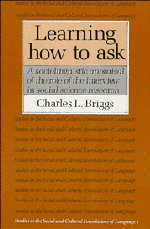 Learning How to Ask
Learning How to Ask Book contents
- Frontmatter
- Contents
- Foreword by Aaron V. Cicourel
- Preface
- 1 Introduction
- 2 The setting: Mexicano society and Córdova, New Mexico
- 3 Interview techniques vis-à-vis native metacommunicative repertoires; or, on the analysis of communicative blunders
- 4 The acquisition of metacommunicative competence
- 5 Listen before you leap: toward methodological sophistication
- 6 Conclusion: theoretical quagmires and “purely methodological” issues
- Notes
- References
- Index
4 - The acquisition of metacommunicative competence
Published online by Cambridge University Press: 05 June 2012
- Frontmatter
- Contents
- Foreword by Aaron V. Cicourel
- Preface
- 1 Introduction
- 2 The setting: Mexicano society and Córdova, New Mexico
- 3 Interview techniques vis-à-vis native metacommunicative repertoires; or, on the analysis of communicative blunders
- 4 The acquisition of metacommunicative competence
- 5 Listen before you leap: toward methodological sophistication
- 6 Conclusion: theoretical quagmires and “purely methodological” issues
- Notes
- References
- Index
Summary
Chapter 3 took a corpus of interview data and attempted to isolate the sources of a broad range of procedural problems. The analysis may have provided some retrospective clarification regarding specific obstacles to the success of interviews and their interpretation. As I argued in Chapter 1, however, it is impossible to judge the effects of using interview techniques in a given speech community without learning something about the way language is used in other contexts. This limitation is imposed by the inverted logic that poses the interview as a starting point and then proceeds to the discovery of basic communicative norms as they impinge on the interview. This process will only result in an ad hoc, piecemeal picture of local speech patterns. A far better procedure is to concentrate initially on discerning the norms that govern speech in the local community and then to compare these with the patterns that underlie the interview. This chapter applies the latter approach to the Mexicano data.
The need to order the methodological process in this way is heightened by our using the interview for more than just obtaining assorted bits of information, particularly when we conduct research in another society or with members of another social class or ethnic population. The interview, along with observation, is generally the primary means of gaining the knowledge and skills required to develop a minimal competence in the native language and culture.
- Type
- Chapter
- Information
- Learning How to AskA Sociolinguistic Appraisal of the Role of the Interview in Social Science Research, pp. 61 - 92Publisher: Cambridge University PressPrint publication year: 1986
